Online grocer Ocado has overtaken Tesco in terms of stock market value as investors continue to bet on the firm.
Ocado is now valued at £21.7bn, more than Tesco’s £21.1bn, despite having only a fraction of the UK grocery market share.
Analysts said a rise in online food shopping, plus Ocado’s new tie up with Marks & Spencer, had encouraged investors.
However, question marks remain as to whether Ocado is over-valued.
According to analyst firm Kantar, Ocado has only 1.7% of the UK grocery market, compared with Tesco’s 26.8% share – which far outstrips its nearest competitors, Sainsbury’s and Asda.
‘Charity’ jibe
Ocado was launched 20 years ago but in most of those years struggled to make money.
Ocado’s share price, which had been healthy after striking a number of big deals with overseas grocery businesses, began to climb quite quickly after the UK coronavirus lockdown in March.
A former Tesco chief executive once described the firm as a “charity” because of the losses it had racked up in its early years.
The business started to flourish in 2017 after cutting deals with US group Kroger, Casino in France, Sobeys in Canada, and ICA Group in Sweden. It then signed a partnership agreement with Coles in Australia.
Its stock market valuation has largely been driven by how investors view its technology, which provides retailers with the infrastructure and software to build their online service and compete with giants such as Amazon.
Market value
That valuation picked up speed after the coronavirus crisis really started to bite in the UK and elsewhere in March as lockdown boosted demand for online groceries.
Ocado’s share price got a further boost recently after its switch to delivering M&S food and after it reported a 50% jump in third quarter sales.
- Ocado says M&S switchover ‘successful’ after rocky start
- Ocado halts staff deliveries temporarily amid order backlog
This was despite some customers criticising Ocado when it launched its M&S range, saying orders made weeks earlier had been cancelled at the last minute.
The retailer also halted orders from its staff as it tried to clear an order backlog.
Elephant
Despite its popularity with investors, Neil Wilson, chief market analyst at Markets.com, questioned its market valuation.
“Ocado holds enormous promise but whether it can deliver is quite another matter, the cash burn remains and the payback from all these overseas deals is taking a very long time,” he said.
One of the reasons for Ocado’s valuation is the expected revenue from its overseas deals, but these “have been slow to materialise”, he said.
While Ocado’s share price “has rocketed this year thanks to the boom in online retail”, one of the problems for Ocado is that “setting up fulfilment centres costs a lot and the returns are slow,” Mr Wilson said.
He added that “investors put an enormous premium on growth so are prepared to pay a lot for any company that has a strong growth profile.”
Julie Palmer, partner at Begbies Traynor, said the coronavirus pandemic had aided the firm: “Where there is crisis, there is opportunity. These words have never been truer for logistics businesses at the moment, which is one of the reasons that Ocado appeals to investors.”
However, she said the challenge for the business is now to retain the growth it has seen since the Covid-19 outbreak.
“There is an elephant in the room with Amazon, which could strike this sector hard with innovation through technology at any point,” she said.
“This is a fact that must play on the mind of chief executive, Tim Steiner, and should make sure that he doesn’t become complacent,” Ms Palmer added.
Amazon, which launched an online supermarket service in the UK in 2016, has been making further moves into selling groceries.
These include a partnership with Morrisons, which said on Tuesday it would be taking on 1,000 permanent staff for its services on Amazon.

